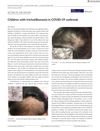 July 2020 in “Scholars journal of applied medical sciences”
July 2020 in “Scholars journal of applied medical sciences” Sodium valproate caused vomiting, hair loss, loss of appetite, abdominal pain, weight gain, and anemia in young children with epilepsy.
 February 2020 in “Scholars academic journal of pharmacy”
February 2020 in “Scholars academic journal of pharmacy” The weight loss drug Orlistat can cause liver damage and should be used with caution, especially in those with liver or kidney issues.

Human hair follicle cells can be turned into stem cells that may help clone hair for treating hair loss or burns.
[object Object]  January 2016 in “Journal of The Korean Medical Association”
January 2016 in “Journal of The Korean Medical Association” The document says how to diagnose and treat hair loss from alopecia areata, but there's no cure and treatments vary.
 83 citations,
June 2018 in “Frontiers in immunology”
83 citations,
June 2018 in “Frontiers in immunology” Certain types of T cells are essential for healthy skin and play a role in skin diseases, but more research is needed to improve treatments.
 December 2024 in “Frontiers in Veterinary Science”
December 2024 in “Frontiers in Veterinary Science” Dorper sheep's wool shedding is linked to specific genes and pathways, which may help understand human hair growth.
 May 2024 in “Frontiers in Immunology”
May 2024 in “Frontiers in Immunology” Type-2 immunity may influence skin diseases and could be targeted for treatment.
 March 2024 in “Frontiers in endocrinology”
March 2024 in “Frontiers in endocrinology” A new MTX2 gene mutation caused a severe genetic disorder in a young Chinese girl.
 February 2022 in “International journal of KIU”
February 2022 in “International journal of KIU” Certain genes and nutrients like vitamin D, zinc, and omega fatty acids affect COVID-19 severity and infection risk.
[object Object] 2 citations,
September 2022 in “Frontiers in Nutrition” High-dose vitamin D3 does not improve symptoms or quality of life in COVID-19 patients after one year.
188 citations,
October 2014 in “Thyroid” Dabrafenib was effective and well tolerated in treating thyroid cancer with a specific mutation.
 5 citations,
May 2021 in “Journal of Cosmetic Dermatology”
5 citations,
May 2021 in “Journal of Cosmetic Dermatology” More children are showing signs of hair-pulling disorders during the COVID-19 pandemic due to stress and lack of social interaction.
 January 2024 in “Figshare”
January 2024 in “Figshare” Turpentine ointment is effective and safe for treating folliculitis.
 January 2024 in “Figshare”
January 2024 in “Figshare” Turpentine ointment is an effective and safe treatment for folliculitis.
 November 2023 in “Journal of Drugs in Dermatology”
November 2023 in “Journal of Drugs in Dermatology” Hypochlorous acid spray improves wound healing and reduces redness and itching in hair transplant surgery.
245 citations,
October 2015 in “Nature medicine” Hair follicle-derived IL-7 and IL-15 are crucial for maintaining skin-resident memory T cells and could be targeted for treating skin diseases and lymphoma.
98 citations,
March 2019 in “Frontiers in immunology” Damaging mutations in NFKB2 cause a severe and distinct form of primary immunodeficiency with early-onset and often ACTH-deficiency.
 42 citations,
July 2021 in “Frontiers in Medicine”
42 citations,
July 2021 in “Frontiers in Medicine” Proxalutamide significantly lowered hospital admissions for male COVID-19 patients compared to a placebo.
 35 citations,
November 2020 in “Dermatologic Therapy”
35 citations,
November 2020 in “Dermatologic Therapy” Severe COVID-19 may cause hair loss, and doctors recommend supplements and topical treatments to manage it.
17 citations,
April 2021 in “Frontiers in Pharmacology” Activating Nrf2 can help protect against hearing loss.
 17 citations,
January 2021 in “Dermatology and Therapy”
17 citations,
January 2021 in “Dermatology and Therapy” Laser-assisted drug delivery has shown improved treatment outcomes for skin conditions and has potential to reduce side effects and treatment time.
 15 citations,
January 2014 in “Anais Brasileiros de Dermatologia”
15 citations,
January 2014 in “Anais Brasileiros de Dermatologia” Lupus treatment requires a combination of drugs and therapies, with research needed for new options.
 12 citations,
April 2019 in “Scientific Reports”
12 citations,
April 2019 in “Scientific Reports” A protein called HMGB1 helps hair grow by affecting prostaglandin metabolism.
 1 citations,
March 2023 in “Frontiers in Cardiovascular Medicine”
1 citations,
March 2023 in “Frontiers in Cardiovascular Medicine” A specific gene variant is linked to heart disease, increased heart muscle, curly hair, and thick skin on palms and soles.

Metformin can cause rare severe skin reactions.
 October 2023 in “Scientific Reports”
October 2023 in “Scientific Reports” Gene therapy helped rats with a specific type of rickets grow hair without severe inflammation.
 August 2023 in “Iranian Journal of Clinical Infectious Diseases”
August 2023 in “Iranian Journal of Clinical Infectious Diseases” Most skin issues were due to COVID-19, with some caused by vaccines or treatments, and were categorized into five types.
 August 2021 in “Journal of skin and stem cell”
August 2021 in “Journal of skin and stem cell” Skin symptoms could help in early COVID-19 diagnosis but more research is needed to confirm their reliability.
 April 2021 in “Rheumatology”
April 2021 in “Rheumatology” An 80-year-old man with COVID-19 also had constrictive pericarditis, possibly due to an autoimmune or immunoglobulin related disease, and improved after surgery.
January 2018 in “Figshare” Ruxolitinib and tofacitinib are effective and safe for treating severe alopecia areata.
























